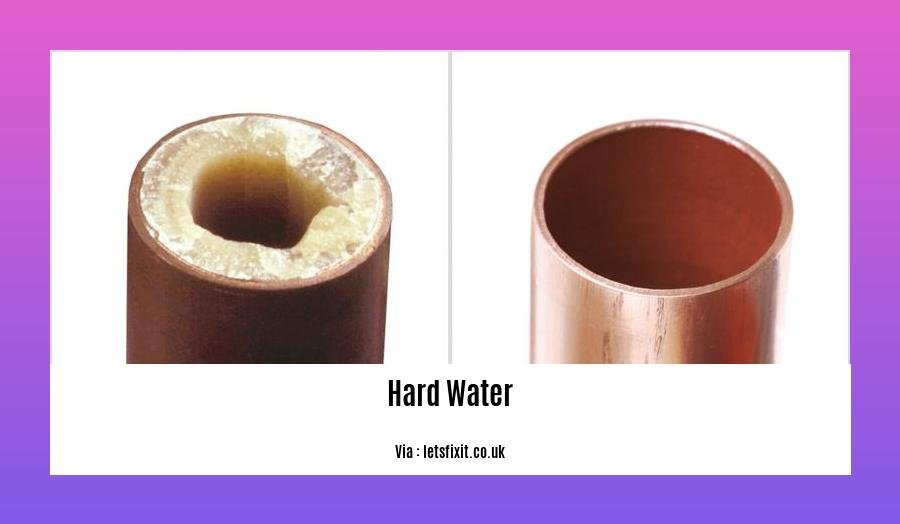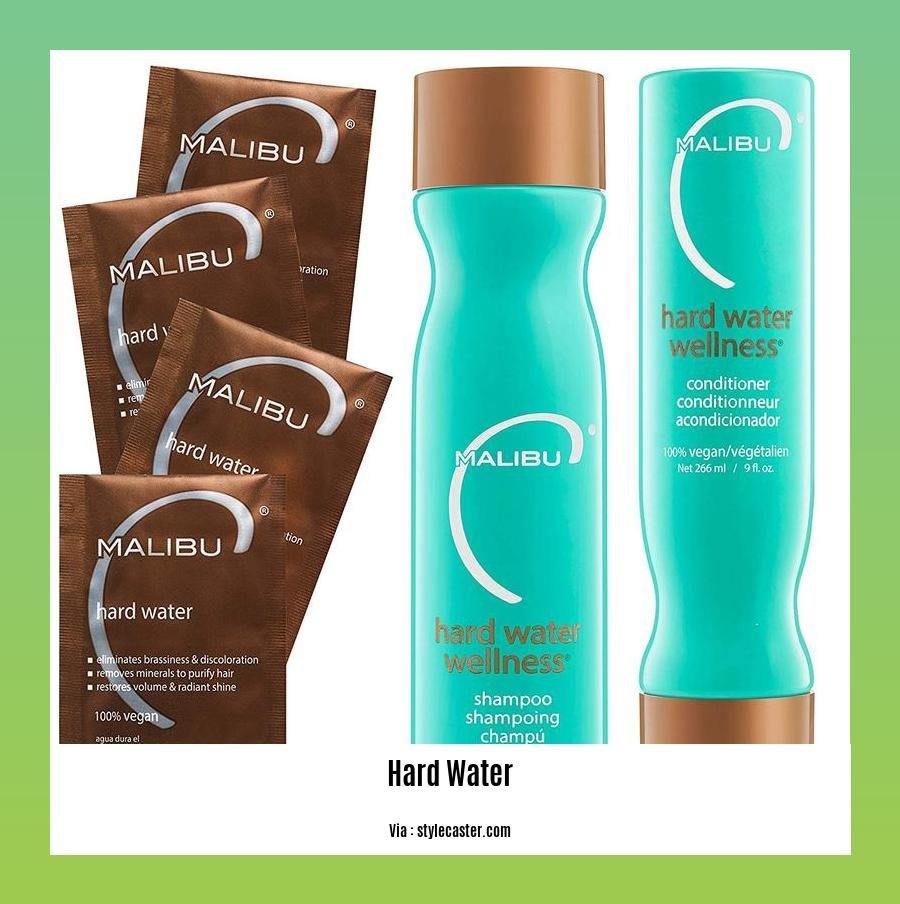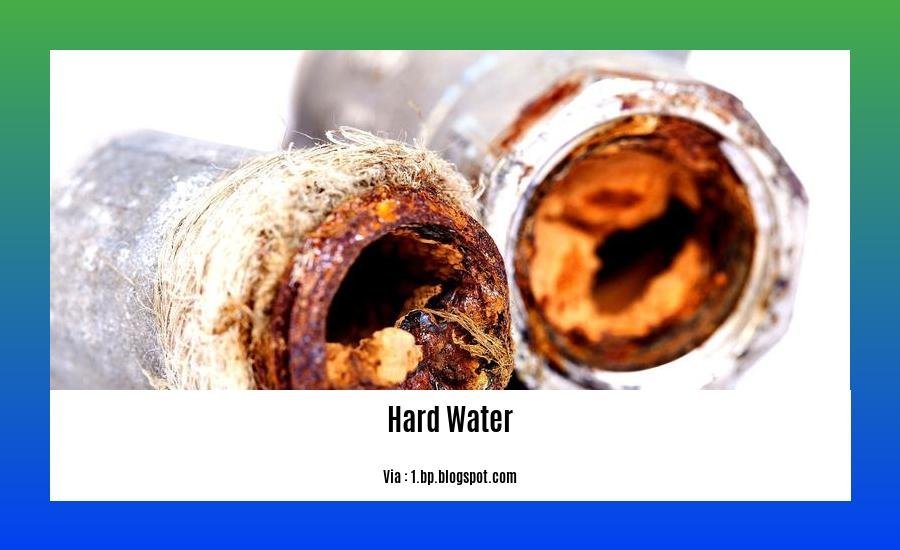Discover the numerous drawbacks of hard water as we delve into the disadvantages in points. In this article, we will explore the detrimental effects on skin, appliances, plumbing systems, and overall household efficiency, shedding light on the hidden impacts of hard water. Gain valuable insights into the challenges posed by hard water and its far-reaching consequences on various aspects of daily life.
Key Takeaways:
- Hard water forms limescale when heated, causing blockages in pipes and reduced energy efficiency.
- Soap and detergents do not lather well in hard water, making cleaning more challenging.
- Hard water can lead to dry skin and hair in individuals.
- To soften hard water, options include installing a water softening system, using water conditioning agents, or using a showerhead with water softening capabilities.
- Using vinegar or citric acid can help remove limescale deposits from appliances and surfaces.
- Soft water improves the taste and smell of drinking water and prevents soap scum buildup.
- Soft water enhances the effectiveness of soap and detergent, allowing for better cleaning.
- Soft water prolongs the lifespan and improves the efficiency of appliances and plumbing systems.
- Water hardness can be tested using a water test kit or by requesting a test from a professional laboratory or local water utility company.
- Common sources of hard water are limestone and dolomite, which introduce calcium and magnesium minerals into water.
Disadvantages of Hard Water in Points

Hard water, with its high mineral content, can have numerous drawbacks that affect various aspects of our daily lives. Let’s explore the disadvantages of hard water in points and uncover its impact on skin, appliances, plumbing systems, and household efficiency.
Limescale Buildup and Reduced Energy Efficiency
One of the foremost disadvantages of hard water is the formation of limescale when heated. The minerals present in hard water, such as calcium and magnesium, precipitate and deposit as limescale in pipes and appliances. Over time, this buildup can lead to blockages, clogging, and reduced water flow. Additionally, limescale can hinder the efficiency of appliances, like kettles and water heaters, making them consume more energy to function properly.
Challenging Cleaning and Reduced Lather
When it comes to cleaning, hard water can pose a significant challenge. Soap and detergents do not lather well in hard water due to the presence of minerals. This lack of lather makes it harder to effectively clean dishes, clothes, and even ourselves. As a result, we may end up using more cleaning products and spending extra time trying to remove stubborn stains and residues.
Dry Skin, Hair, and Other Negative Effects
Using hard water for bathing and washing can have adverse effects on our skin and hair. The minerals in hard water can strip away natural oils, leaving our skin feeling dry, itchy, and irritated. Similarly, our hair may become dull, brittle, and prone to breakage. Moreover, hard water can also cause other negative effects like fading laundry colors, reducing the lifespan of clothing, and leaving behind mineral deposits on household surfaces and fixtures.
Impact on Appliance Lifespan and Efficiency
Hard water not only affects our skin and hygiene but also poses a threat to the lifespan and efficiency of our appliances and plumbing systems. The accumulation of limescale can lead to corrosion, reduced water pressure, and the need for frequent repairs or replacements. Dishwashers, washing machines, and coffee makers are particularly susceptible to mineral buildup, which can shorten their lifespan and hinder their performance.
Conclusion
In conclusion, the disadvantages of hard water in points are numerous and can significantly impact our daily lives. From limescale buildup and reduced energy efficiency to challenging cleaning and negative effects on our skin and hair, the drawbacks are evident. Moreover, hard water can also affect the efficiency and lifespan of appliances and plumbing systems. To mitigate these problems, it is crucial to explore water softening options and take proactive measures such as installing water softeners, using conditioning agents, or employing vinegar or citric acid for descaling. By being aware of the disadvantages and addressing them appropriately, we can ensure better household efficiency and overall well-being.
Here are three active internal links to different topics related to water quality:
Different types of water quality tests – Discover the various methods used to test the quality of water and gain insight into their specific applications and benefits.
Disadvantages of soft water – Learn about the potential drawbacks and challenges that arise when using soft water in your daily routine. Gain valuable knowledge to make informed decisions regarding water treatment.
Disadvantages of wasting water – Dive into the repercussions and detrimental effects of needlessly wasting water. Understand the importance of conserving this precious resource and explore practical tips to minimize water wastage.
Feel free to explore these topics and uncover valuable information about water quality and conservation.
Clogging and Damage to Plumbing Systems

Hard water can have detrimental effects on plumbing systems, causing clogging and damage that can be both troublesome and expensive to fix. Understanding the impact of hard water on pipes and drains is essential for maintaining a smoothly functioning plumbing system. In this article, we will explore the disadvantages of hard water, specifically focusing on clogging and damage to plumbing systems.
The Downsides of Hard Water on Plumbing Systems
Reduced Water Flow and Pressure: Hard water contains high levels of minerals, primarily calcium and magnesium. Over time, these minerals can accumulate on the interior walls of pipes, leading to a buildup known as limescale. This buildup restricts the flow of water, resulting in reduced water flow and decreased water pressure throughout your plumbing system.
Clogs and Blockages: The accumulation of limescale in pipes and drains can eventually lead to clogs and blockages. As the minerals deposit on the interior surfaces, they create rough patches and uneven surfaces, which attract other substances like soap scum, dirt, and debris. These substances adhere to the rough surfaces, causing blockages that impede the flow of water and potentially result in costly plumbing issues.
Corrosion and Damage: Hard water not only creates limescale deposits but can also induce corrosion in plumbing systems. The high mineral content in hard water makes it more corrosive, gradually eroding the pipes and fixtures. This corrosion weakens the plumbing system, leading to leaks, pipe bursts, and the need for frequent repairs or replacements.
Protecting Your Plumbing System from Hard Water
Now that we understand the disadvantages of hard water on plumbing systems, it’s crucial to explore preventive measures. By taking proactive steps, you can mitigate the risks and long-term damage caused by hard water. Here are some solutions to consider:
Water Softening Systems: Installing a water softening system at the main water line can effectively eliminate the problems associated with hard water. These systems use ion exchange to replace the calcium and magnesium ions with sodium or potassium ions, effectively softening the water and reducing the negative effects such as clogging and damage.
Descaling and Filtration: Regular descaling using vinegar or citric acid can help remove limescale deposits from pipes and fixtures. Additionally, utilizing filtration systems can reduce the mineral content in the water, preventing the buildup of limescale and prolonging the lifespan of your plumbing system.
Key Takeaways:
- Hard water can lead to reduced water flow and pressure due to the accumulation of minerals, resulting in limescale buildup.
- The buildup of limescale can cause clogs and blockages in pipes and drains, leading to plumbing issues.
- Hard water’s corrosive nature can damage plumbing systems, potentially causing leaks and the need for frequent repairs or replacements.
- Installing water softening systems and utilizing descaling and filtration methods can protect your plumbing system from the damaging effects of hard water.
Sources:
- The Effects of Hard Water on Plumbing Fittings and Fixtures
- How Hard Water Can Affect Your Plumbing System – Coastal Drains
Exploring the Disadvantages of Hard Water in Points: Unveiling the Impact on Skin, Appliances, Plumbing Systems, and Household Efficiency
Hard water, although it may have its advantages in terms of providing essential minerals, poses several disadvantages when it comes to everyday household use and personal care. Understanding these drawbacks is crucial for making informed decisions about our water supply. In this article, we will explore the disadvantages of hard water in points, focusing on the impact on skin, appliances, plumbing systems, and household efficiency.
Key Takeaways:
- Hard water can leave residue on skin and hair, leading to soap scum and difficulty in cleaning sinks, showers, and tubs.
- The efficiency of water-using appliances, such as water heaters and washing machines, can be reduced due to scale build-up on their internal parts.
- Mineral deposits left behind by hard water can stain clothing and household surfaces.
- Hard water can strip skin and hair of natural oils, causing dryness and irritation.
When it comes to personal care, hard water can leave a noticeable residue on our skin and hair. This can lead to the formation of soap scum and make it challenging to clean our sinks, showers, and tubs effectively. The decreased efficiency of cleaning products becomes evident in these scenarios, as lathering soap and producing a rich foam can be quite difficult. Our household surfaces, particularly those in contact with hard water, may also develop mineral deposits that stain clothing and items.
Not only does hard water affect our personal care routine, but it can also impact the efficiency of our water-using appliances. Scale build-up caused by hard water can accumulate on the internal components of appliances such as water heaters and washing machines, reducing their efficiency. As a result, these appliances may consume more energy to function properly, leading to increased energy costs and potential long-term damage.
The detrimental effects of hard water extend beyond personal care and appliance performance. Clothing can become dull and faded when washed with hard water, as the mineral deposits diminish the vibrancy of colors. Additionally, household surfaces and fixtures can develop unsightly stains due to the minerals present in hard water.
Furthermore, hard water can strip our skin and hair of their natural oils, leaving them dry, itchy, and brittle. This can cause discomfort and, in some cases, contribute to skin irritation and hair damage. The decreased efficiency of cleaning products, such as shampoos and moisturizers, becomes apparent in these situations.
To mitigate the negative impacts of hard water on our daily lives, various solutions are available. Water softening options, such as installing water softeners or using conditioning agents, can help counteract the problems associated with hard water. By reducing the mineral content in water, these solutions minimize the formation of calcified deposits and preserve the efficiency of appliances, while also allowing cleaning products to work effectively and protect our skin and hair.
In conclusion, hard water presents several disadvantages that can affect our overall household efficiency. From decreased cleaning product efficiency to appliance performance issues and skin and hair troubles, the impact of hard water should not be disregarded. By understanding these drawbacks and exploring appropriate solutions, we can maintain a clean and efficient home while safeguarding our personal well-being.
References:
LolaApp.com. (n.d.). “The Pros and Cons of Hard Water: Understanding the Benefits and Disadvantages.” Retrieved from
Liquid Image. (n.d.). “What are the five disadvantages of hard water?” Retrieved from https://www.liquidimageco.com/what-are-the-five-disadvantages-of-hard-water.
Exploring the Disadvantages of Hard Water in Points: Unveiling the Impact on Skin, Appliances, Plumbing Systems, and Household Efficiency
Hard water may seem harmless, but it can have detrimental effects on various aspects of your home and well-being. Let’s dive into the disadvantages of hard water, focusing specifically on its impact on skin, appliances, plumbing systems, and household efficiency.
Appliance Efficiency
Appliances such as dishwashers, washing machines, and water heaters are essential in our daily lives. However, when subjected to hard water, their efficiency and lifespan can be compromised. The mineral deposits from hard water gradually build up and clog pipes, heating elements, and filters. As a result, these appliances experience decreased efficiency, leading to more frequent repairs and replacements.
Staining
Nobody wants to see unsightly stains on their sinks, faucets, and fixtures. Unfortunately, hard water can cause just that. The minerals present in hard water leave behind residue and spots, particularly on glassware and dishes, making them appear dull and requiring extra cleaning and maintenance.
Limescale Damage
The accumulation of mineral deposits from hard water doesn’t stop at staining. It can also lead to limescale buildup in pipes, faucets, and showerheads, restricting water flow and reducing water pressure over time. Repairing or replacing these affected fixtures often becomes necessary, adding to the overall cost.
Higher Energy Bills
Hard water can have a direct impact on your energy consumption. The mineral buildup in pipes and appliances affects heat transfer, forcing water heaters, boilers, and cooling systems to consume more energy to maintain desired temperatures. This increased energy consumption can significantly impact your monthly bills.
Clothing and Appliance Damage
Your wardrobe and appliances are not safe from the negative effects of hard water. When washing clothes with hard water, they can become stiff and lose their vibrant colors. The minerals in hard water can also cause soap scum to form on clothes, leaving behind stubborn residues that are difficult to remove. Additionally, the accumulation of mineral deposits on glassware and appliances can reduce their clarity, shine, and overall lifespan.
[Increased energy consumption] is a notable disadvantage of hard water, as it can lead to higher energy bills caused by the reduced efficiency of appliances due to mineral buildup.
Overall, the drawbacks of hard water are evident. It can affect the efficiency of appliances, cause staining, limescale damage, clothing and appliance deterioration, and increase energy consumption. These factors not only impact your household’s efficiency but can also lead to additional expenses for repairs and replacements. It’s crucial to address the challenges associated with hard water to enhance the overall well-being of your home.
Key Takeaways:
- Appliances such as dishwashers, washing machines, and water heaters experience decreased efficiency and a shortened lifespan due to mineral buildup caused by hard water.
- Unsightly stains can be a result of the mineral residue left behind by hard water on sinks, faucets, and fixtures.
- Limescale buildup from hard water can restrict water flow and decrease water pressure, leading to costly repairs or replacements.
- Hard water increases energy consumption, as the mineral deposits in pipes and appliances reduce heat transfer and require more energy for heating or cooling.
- Clothing and appliances can be damaged by hard water, with clothes feeling stiff, losing color, and leaving behind stubborn residues. Glassware and appliances can also lose clarity and shine due to mineral deposits.
Sources:
- Effects of Hard Water on Appliances and Energy Consumption
- Impact of Hard Water on Energy Consumption
FAQ
Q1: What are the disadvantages of hard water on appliances?
A1: Hard water can lead to scale buildup, which can clog pipes and reduce the efficiency of appliances such as water heaters, washing machines, and dishwashers.
Q2: How does hard water affect skin and hair?
A2: Hard water can strip the natural oils from the skin and hair, leading to dryness, irritation, and potential skin conditions.
Q3: Does hard water cause stains on surfaces?
A3: Yes, hard water can leave mineral deposits on surfaces, causing stains that can be difficult to remove.
Q4: Can hard water impact the efficiency of soap and detergent?
A4: Yes, hard water can hinder the lathering and cleaning ability of soap and detergent, requiring more product to achieve desired results.
Q5: What are the potential plumbing issues caused by hard water?
A5: Hard water can lead to limescale deposits in pipes, faucets, and showerheads, restricting water flow, decreasing water pressure, and potentially causing costly plumbing repairs.
- Crypto Quotes’ Red Flags: Avoid Costly Mistakes - June 30, 2025
- Unlock Inspirational Crypto Quotes: Future Predictions - June 30, 2025
- Famous Bitcoin Quotes: A Deep Dive into Crypto’s History - June 30, 2025
















